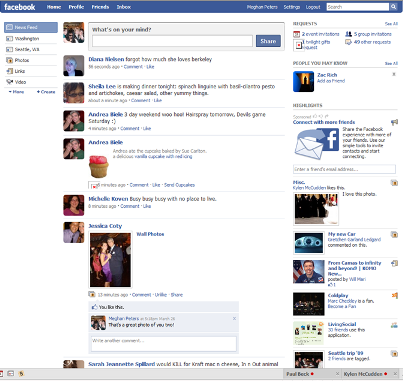
Though technology nowadays is constantly updated, change never seems to come easily to Facebook users.
When the site changed its format two-and-a-half years ago to include the News Feed feature, outrage ensued. People were confused about how to navigate the new homepage, and they didn't want constant updates about their friends. Eventually, users realized they couldn't do anything to change it, familiarized themselves and continued plugging into the social networking site.
Earlier this month, Facebook rolled out a new and more Twitter-like format. The home page is constantly updated with snippets of friends' statuses, wall conversations and anything else they would like to "share," while the homepage sidebar (called Highlights) features groups, events, photo albums, etc. that friends have recently joined or posted.

Rather than improving its social use, the new format is monetizing Facebook even more than its previous changes. It gives ads better placement and is more useful for companies who use the site for marketing.
When I first checked out the new format, I was using the site for work. I help manage my team's fan page, which we use to get people excited about working at Microsoft and drive traffic to our other Web resources. With the new format, we are able to create status updates for the page, which can show up in our fans' homepage streams, encouraging more visits to our page. This has been useful in getting more feedback on what we post, and bringing more people to the page.
Yet when I signed on later to use my personal account, the new format was disappointing. I've never been one for writing statuses, and now the site is prompting me to create them on not only my profile but also my homepage. And most of the status updates in my stream were from people I didn't care to hear about. I don't need to know that a guy I worked with at my college radio station for a few months but haven't talked to in years "is sitting in his boxers, unwilling to do the laundry that would alleviate his condition of undress." (Updated 43 seconds ago.)
The largest anti-new-Facebook group, Petition Against the New Facebook, now has more than 1.7 million members. On the group wall, one user said, "The Facebook we have at the moment is messy and cluttered," while another cited "I DO NOT care what stupid quiz people have taken," as a reason for disliking the current format. Some users have even called for boycotts.
This week, Facebook gave in to its users' cries. The site plans to tweak some of the new features according to requests. However, these changes will not bring back the old format, but rather improve the new one.
With the number of new social networking sites popping up, it makes sense that Facebook sees the need to stay on its toes. But by making these changes, the site is missing what makes new social media so successful: a specific purpose. LinkedIn, for example, caters to professionals who are looking to keep up with industry contacts or colleagues. Even Twitter, which some argue is Facebook's biggest competition, is ideal for short news blasts or hearing about events.
For me, Facebook was a way to connect with old classmates or colleagues and post photos of friends I hang out with. Now it's trying to be all these social networking sites rolled into one, and it's too much.
Users still want Facebook to be their way to connect with friends, which is why that college radio friend of mine feels comfortable saying he's sitting around in his boxers. I can almost guarantee he wasn't expecting someone like me, whom he hasn't spoken to since 2006, to see that, much less blog about it. Yet I find it hard to believe he would ever say something like that on LinkedIn or even Twitter.
In general, social networking sites have allowed us to share more information with more people than we normally would. When it comes to Facebook, its personal nature prompts us to post almost anything about ourselves. In some cases, it can be great to find this news. A few months ago, I found out via Facebook that a childhood friend got married and had a baby last year. But when my sister called me last week, upset because her ex-boyfriend was listed as "in a relationship" four days after breaking up with her, I hated Facebook for allowing people to share personal information.
For sites like Twitter and LinkedIn, constantly sharing information with contacts is acceptable and more often useful because the sites are less personal and have more specific intentions than Facebook. But the new Facebook format makes the site seem insensitive about the type of information its users are sharing. If the site is looking to make more money from ads by changing its format, it needs to be more creative and more understanding of what users who don't use the site for ads or marketing are getting out of it. Borrowing Twitter's look will only alienate Facebook users, and won't bring the site any closer to what it really needs: a distinguished aim.
Related
Sign up for Peacock to stream NBCU shows.
to stream NBCU shows.